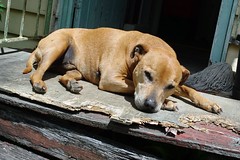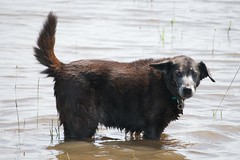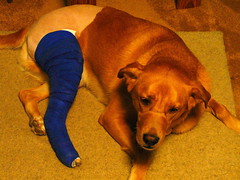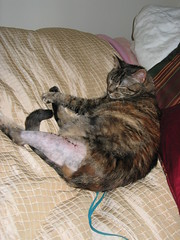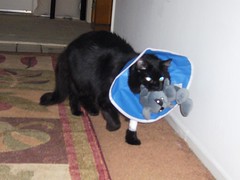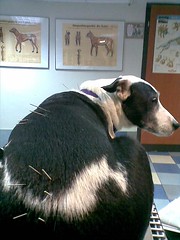 Much of the year I am so booked up that I am not able to take new patients but my assistant Diane knows just the right thing to say to make me sneak in an extra special one. “Lena, there is this amazing dog I meet at the clinic who was just diagnosed with cancer, is there any way you think we can work them into the schedule?”
Much of the year I am so booked up that I am not able to take new patients but my assistant Diane knows just the right thing to say to make me sneak in an extra special one. “Lena, there is this amazing dog I meet at the clinic who was just diagnosed with cancer, is there any way you think we can work them into the schedule?”
I can’t say enough about the power of acupuncture for animals with cancer! Of all the work I have done with this disease I am still amazed at how well acupuncture can help these wonderful animals live with cancer.
I love being able to make animals feel better and it brings tears to my eyes to be able to help the people I work with have their beloved animals for longer. Currently I have a number of animals who are living, and living well, more then a year out, with cancer that should have taken them in a matter of months.
When I first became an acupuncturist I took over doing acupuncture for an amazing dog named Rooney. Rooney had been diagnosed with bladder cancer about 4 months before I meet her and she was supposed to be gone within three months of her diagnosis, even with the chemotherapy she was getting. I started treating her every week and over that time was blessed to get to work with one of the most amazing dogs I would ever meet and her wonderful moms. Rooney was not supposed to live but she made it almost three years with chemotherapy and acupuncture. She was rarely sick during that time and she lived a very normal dog life up until her last month. See Rooney’s Wisdom.
 Rooney is unusual in that I only worked with acupuncture with her and not herbs. For most of the animals I treat I recommend an integrated approach that combined acupuncture, herbs and often times some western treatments as well.
Rooney is unusual in that I only worked with acupuncture with her and not herbs. For most of the animals I treat I recommend an integrated approach that combined acupuncture, herbs and often times some western treatments as well.
The wonderful thing about acupuncture is that there are not major side effects like with chemotherapy, surgery and even some of the herbs I use. Because of this, it can be used in some of the most sick and old animals. Although I find it works best if it can be started before an animal is severely debilitated.
So what are the main benefits of acupuncture?
- Increased longevity – almost all the animals I treat for cancer end up living much longer than the normal prognosis, usually at least double prognosis time. In some animals this ends up being years beyond prognosis. For a treatment with no major side effects this is pretty amazing.
- Increased well being and energy – acupuncture can increase energy and help to regulate the hormones in the body. Cancer can make animals feel sick – acupuncture helps to reverse this. This is the most important benefit I see with acupuncture treatments. Animals are happy again and people feel like they have had their beloved companion returned to them.
- Decreased pain – cancer can be painful. Acupuncture can significantly reduce that pain and help to reduce side effects to some of the pain drugs. I had a dear little bunny I treated who had a very painful spinal tumor. With acupuncture every two weeks we were able to keep him happy for about six months.
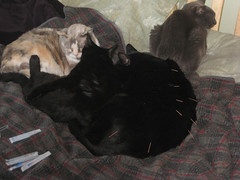
- Immune system support – cancer is a failure of the immune system. Acupuncture stimulates the immune system so that it can fight the cancer better.In some animals, I have actually seen tumors shrink with just acupuncture alone.
- Increased blood circulation – to the cells you want to get blood. There is some thought that acupuncture can help to pull blood away from cancer cells and give it to the parts of the body that need it. Often times with cancer the body ends up without enough nutrients and energy because the cancer takes it all. Acupuncture helps to reverse this.
- Increased appetite – some animals with cancer feel so sick that they don’t want to eat. Acupuncture can help to stimulate appetite.
- Chemotherapy and radiation support – both these therapies are very hard on the immune system and body. Acupuncture helps to keep white blood cell numbers up during these therapies and helps decrease the side effects. If white blood cells drop too low, chemotherapy needs to be stopped. Acupuncture can usually raise blood cell numbers within a week.
How often should an animal with cancer be treated?
I recommend scheduling acupuncture treatments at least every two weeks. In some very sick animals I will recommend weekly treatments and I usually start with weekly treatments for a few weeks. I have a few animals I have treated every three weeks and I had one dog who did very well with monthly treatments but over all I have found animals do much better with weekly or every other week treatments. The acupuncturist you work with may have different experiences.
Where do I find a veterinary acupuncturist to treat my animals?
 The best tool I have found is through the International Veterinary acupuncture Society’s website. Find a veterinary acupuncturist in your area.
The best tool I have found is through the International Veterinary acupuncture Society’s website. Find a veterinary acupuncturist in your area.
I should note that all good veterinary acupuncturists are not on this list. I’m not because the certification program I went through is not recognized by IVAS. In addition someone being listed just means they are certified by IVAS or one of its recognized programs, not how experienced or good they are. Ask around in your area to see if there is someone that is highly recommended. Ask your vet, at the local pet store, at the dog park, at the local groomer or among friends and co-workers or search the Internet.
When is the best time to start acupuncture?
Now! Really as soon as possible is best. It is much easier for me to keep an animal from getting sick then try to make them better after they are very ill.
My normal vet or oncologist says I should not do acupuncture or alternative medicine with my animal? What should I do?
 Most vets I have worked with are very open to what I do. In my state and in most states you need to be a veterinarian to do acupuncture on animals. I think that helps us have more support from the mainstream vet community. Since most vets don’t have training in acupuncture or herbal medicine sometimes they just need a little communication. I am always happy to talk to someone’s regular vet or oncologist if there is a conflict when I am working with their animal. Hopefully your veterinary acupuncturist will be willing to also. While I am not always as current on western treatments for cancer, I am usually much more current on the herbal studies and the studies about combining western and alternative medicine.
Most vets I have worked with are very open to what I do. In my state and in most states you need to be a veterinarian to do acupuncture on animals. I think that helps us have more support from the mainstream vet community. Since most vets don’t have training in acupuncture or herbal medicine sometimes they just need a little communication. I am always happy to talk to someone’s regular vet or oncologist if there is a conflict when I am working with their animal. Hopefully your veterinary acupuncturist will be willing to also. While I am not always as current on western treatments for cancer, I am usually much more current on the herbal studies and the studies about combining western and alternative medicine.
Should I use acupuncture with chemotherapy?
Yes! I have found that animals getting acupuncture with chemotherapy not only do better with fewer side effects, but also live longer.
But I don’t want my animal to suffer longer? What if acupuncture helps then to live longer but they are miserable during that time?
I have found that the animals I treat with acupuncture live well and die fast when it is their time. The quality of life while they are alive is usually quite good and they are happy. I have found that when it is time to go they tend to get sick quickly and the passing seems to be easier for both the people involved and the animals because it is so obviously time for them to pass on.
What if I can’t find a veterinary acupuncturist in my area?
While I do think acupuncture works better than acupressure, I think there is a lot of benefit to acupressure and it really can make a large difference in an animal’s health. See if you can find someone who does acupressure treatments or learn yourself. I will publish an article in the near future about how to do acupressure for cancer.
Tallgrass Animal Acupressure Institute has a tool to find a practitioner and offer classes in acupressure.
Find an animal acupressure practitioner.
There are also many good books out there on acupressure. Focus with stimulating the immune system and working with lung, kidneys and spleen. Here are some of my favorites:
Four Paws, Five Directions: A Guide to Chinese Medicine for Cats and Dogs
Acu-Cat: A Guide to Feline Acupressure
The Well-Connected Dog: A Guide to Canine Acupressure
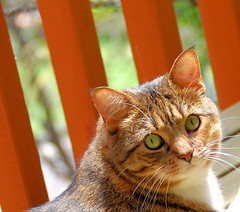 I think there will come a time in my life where we will look back on some of the harsher treatments we use for cancer as being somewhat barbaric. Many of the new treatments emerging work by getting the body to fight cancer itself. There was an amazing article I just read about using modified white blood cells to get rid of leukemia. New leukemia treatment exceeds wildest expectations. Acupuncture fits nicely in with some of these emerging new therapies.
I think there will come a time in my life where we will look back on some of the harsher treatments we use for cancer as being somewhat barbaric. Many of the new treatments emerging work by getting the body to fight cancer itself. There was an amazing article I just read about using modified white blood cells to get rid of leukemia. New leukemia treatment exceeds wildest expectations. Acupuncture fits nicely in with some of these emerging new therapies.
Acupuncture supports the body and helps it to do what it should have been able to in the first place, fight cancer. Most importantly it helps to support our animal friends in their journey through cancer treatment. It helps them to live and love living and gives us more time with them. For me there is no greater joy than seeing that sparkle come back into a dog’s eyes that says I choose life!
Return to Integrative and Holistic Methods for Treating Cancer in Cats and Dogs.
 Prostate cancer wasn’t originally on my list when I began this book, as it is rare and I hadn’t treated a dog with it before. However I recently started treating a very energetic lab named Joey who has prostate cancer. He is one of the most rambunctious, friendly dogs I have met and oh so strong. His coat shines, his eyes sparkle, and he has the most powerful tail I have encountered. I swear he could fuel my whole house with it.
Prostate cancer wasn’t originally on my list when I began this book, as it is rare and I hadn’t treated a dog with it before. However I recently started treating a very energetic lab named Joey who has prostate cancer. He is one of the most rambunctious, friendly dogs I have met and oh so strong. His coat shines, his eyes sparkle, and he has the most powerful tail I have encountered. I swear he could fuel my whole house with it. A while back there was a product on the market to treat prostate cancer in people called PC-SPES. This herbal combination actually helped quite a few people but was taken off the market because of problems with contamination. I am not suggesting that you should use this product or some of the others that have replaced it but I do think it is worth considering the ingredients. It contains some of the same ingredients as in one of the main herbals I use for cancer, Xiao Chai Hu Tang and reishi mushrooms which are known to be quite effective again cancer.
A while back there was a product on the market to treat prostate cancer in people called PC-SPES. This herbal combination actually helped quite a few people but was taken off the market because of problems with contamination. I am not suggesting that you should use this product or some of the others that have replaced it but I do think it is worth considering the ingredients. It contains some of the same ingredients as in one of the main herbals I use for cancer, Xiao Chai Hu Tang and reishi mushrooms which are known to be quite effective again cancer.– cousin to Xue Fu Zhu Yu Tang for the lower abdomen, this is a very effective formula for prostate and urinary bladder cancer, especially when they manifest with bloody urine. I add San Leng
and E Zhu
to mine for extra cancer fighting ingredients.


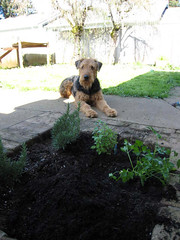

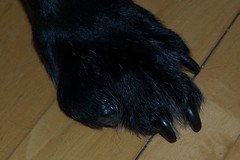

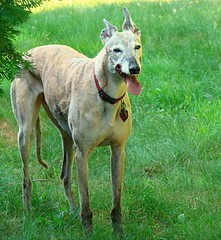
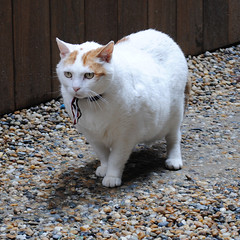

 Rooney is unusual in that I only worked with acupuncture with her and not herbs. For most of the animals I treat I recommend an integrated approach that combined acupuncture, herbs and often times some western treatments as well.
Rooney is unusual in that I only worked with acupuncture with her and not herbs. For most of the animals I treat I recommend an integrated approach that combined acupuncture, herbs and often times some western treatments as well.





